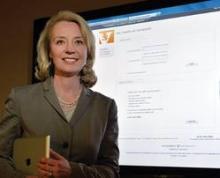Having a far-reaching, positive impact on health populations has long been a primary objective of Dr. Katherine Schneider, a family physician who recently became CI certified. The Pennsylvania doctor started her medical career as the head of a community medicine program, accessing outreach initiatives and working to improve care for the uninsured. She then took on a senior vice president position at AtlantiCare, where she led the system’s strategic transformational work toward accountable care. Dr. Schneider did not hesitate when she learned of the opportunity to become board certified in CI.
"It’s the birth of a new specialty; why not get involved at the very beginning?" said Dr. Schneider, who now serves as chief medical officer for Medecision, a national provider of health care management solutions. CI "by definition, it’s in my everyday work. It’s my role to help make sure we are helping customers use this correctly, understand what our pain points are, and build the right kind of tools to solve problems of effectiveness and efficiency."
Along with bringing new information and technology terms to her current position, her CI training has enabled Dr. Schneider to expand her professional network of clinical informaticians and industry experts, she said.
"One really great benefit is that you meet other people that either do something similar to you or understand the role that you’re in," she said. "Having that peer network is going to be really nice. It’s nice to have recognition that you have expertise in a field. It’s fun to be there at the beginning and participate in the debate about what’s relevant and where it’s going to be in a few years."
For other recently certified physicians, the subspecialty is a door to countless professional paths.
"I became certified to update my skill set and expand my career options," said Dr. Gretchen Purcell Jackson, of the department of pediatric surgery at Vanderbilt University Medical Center, Nashville, Tenn. "I found the quality improvement and project management part of the certification really useful."
In her current practice, Dr. Jackson’s CI training aids in a range of projects, such as helping with a grant she received to study information needs and information management practices of pregnant women and their caregivers.
"The project management aspect of my CI training has been very useful in helping me organize a large clinical study," said Dr. Jackson, who has a PhD in medical information sciences from Stanford (Calif.) University. In addition, "I have recently been asked to help oversee a project that involves coordinating the efforts and technologies from Vanderbilt health information systems, a corporate partner, a non-profit research foundation, and a large funded research project. I use every aspect of my CI training to guide this project. It requires leadership, project management, quality improvement, and clinical and technological expertise."




